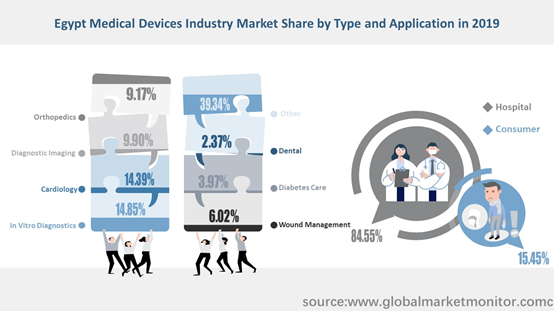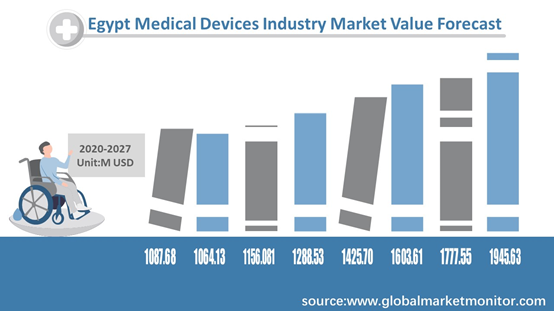Medical
device means any apparatus, implement, appliance, reagent for in vitro use, material
or other similar or related article, used directly or indirectly on the
human body, for one or more specific medical purposes. Its utility is mainly
obtained through physical and other means, not through pharmacological,
immunological or metabolic, but which may be assisted in its intended function
by such means.
Medical
devices can be roughly divided into seven categories according to their types:
in vitro diagnostics, cardiology, diagnostic imaging, orthopedics, wound
management, diabetes care, dental and others. Among them, in vitro diagnostics
accounted for the largest market share, accounting for 14.85% of the Egyptian
medical devices market share in 2019, followed by cardiology, with market share
of 14.39%. The Egyptian government is more inclined to invest in preventive
medicine. Therefore, diagnostic imaging equipment will have greater development
prospects.

Medical devices can be used not only for commercial purposes such as hospitals, clinics and other institutions, but also for consumers own use. Egypt is the second most populous country in the Middle East. Compared with other countries in the Middle East, healthcare industry of Egypt is huge. Although the disposable income of most Egyptian citizens is generally low, they will not be stingy with necessary health care expenditures. Thus it can be seen that Egyptian medical equipment is a potential market.
Analysis of the Status Quo of the Egypt Medical Devices Industry
After a period of development, the industry is at a growth stage. With the continuous upgrading of products and the development of technology and economy, the market continues to expand. Egypt medical devices industry market has become primarily a highly competitive international market. Companies are mainly from USA with relatively high industry concentrate. In 2019, the top three companies, GE Healthcare, Medtronic Egypt LLC and Johnson & Johnson, accounted for revenue market share of 40.27%, with 16.29%, 12.72% and 11.25%, respectively.
Get the Complete Sample, Please Click: https://www.globalmarketmonitor.com/reports/762779-medical-devices-market-report.html
Founded in North America in 1892, GE Healthcare is the leading global medical technology and digital solutions innovator. It enables clinicians to make faster, more informed decisions through intelligent devices, data analytics, applications and services, supported by its Edison intelligence platform. With over 100 years of healthcare industry experience and around 50,000 employees globally, the company operates at the center of an ecosystem working toward precision health, digitizing healthcare, helping drive productivity and improve outcomes for patients, providers and health systems around the world.
Founded in 1949, Medtronic is a global healthcare solutions company operating in approximately 160 countries. It is committed to improving lives through its medical technologies, services, and solutions.
Johnson & Johnson was founded in 1887 and mainly produces healthcare products and provides related services for consumers, pharmaceuticals, medical devices and diagnostics markets. The company also sells products such as skin and hair care products, acetaminophen products, pharmaceuticals, diagnostic equipment, and surgical equipment in countries located around the world.
There is very few medical equipment produced in Egypt, so most of the market is provided by imported products. The few companies that benefit from low tariffs import and sell technical medical equipment, such as radiography and ultrasound equipment, vital statistics monitors, dialysis machines, and laboratory microscopes. The largest of these is El Gomhoureya, a wholly-owned government-owned company.
Good Prospects for the Development of the Egypt Medical Device Industry
The Egyptian government offers a variety of investment opportunities because the Egyptian government is very keen to expand the healthcare industry, especially the medical industry related to medical devices, and plans to improve the industry by introducing a new national health insurance plan.
WHO also strongly supports Egypt to improve public health care, such as expanding family planning services, supporting the new universal health insurance system, and expanding the community health worker program.
Previously, Egypt healthcare system was mainly controlled by the government. In the past decade, as the standards of care in the public sector have declined, the private sector has played a more active role.

According
to our research, the Egypt medical devices industry market has a total value of
625.68 M USD back in 2015, and increased to 1087.68 M USD in 2020. We made the
prediction that the value of Egypt medical devices industry market markets can
be 1945.63 M USD by 2027. The CAGR of Egypt medical devices industry market is
8.66% from 2020 to 2027.
The
elderly population in Egypt continues to increase. It is estimated that by
2050, the demand for hospital beds will increase to more than 100,000. Coupled with
the development of new hospitals and private clinics, Egypt future demand for
hospital beds will be very large.
The
proliferation of private hospitals and clinics has also greatly increased the
demand for medical equipment. Although most Egyptian patients prefer to go to
private medical institutions, private medical institutions are severely
restricted in terms of choice and price. In addition, they are also subject to
competition from Germany, the United States, China and India.
As the
government healthcare reform plan achieves the goal of universal healthcare,
the public sector is expected to account for a large share of expenditure
growth in the next few years. The Egyptian government tends to invest in
preventive medicine, which provides opportunities for medical devices. With the
strong demand and the reduction of expected market barriers, the medical device
industry will achieve substantial economic growth.
We provide more professional and intelligent market reports to complement your business decisions.